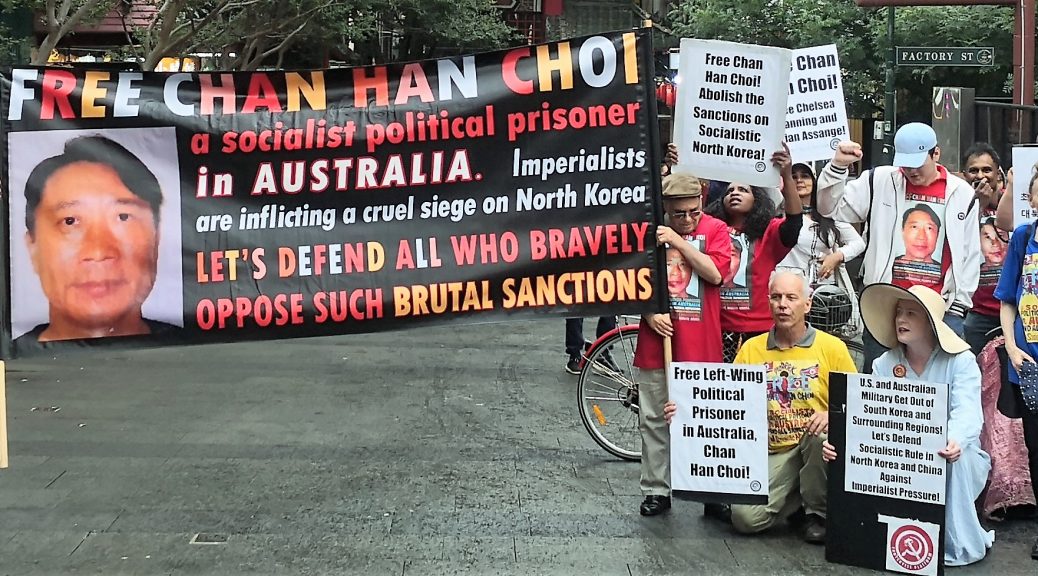Capitalist Court Rejects Chan Han Choi’s Permanent Stay Application
Socialist Political Prisoner
Cannot Get a Fair Trial in Australia
6 December 2019 – Yesterday, a judge in the NSW Supreme Court knocked back a motion by socialist political prisoner, Chan Han Choi, for a Permanent Stay in the proceedings against him. Since his arrest, Australia’s racist, rich people’s regime has violated many of the rights that Choi should be entitled to as a prisoner and defendant. As a result, Choi submitted a motion for a Permanent Stay which was heard last Friday. If the motion had succeeded, Choi’s trial would have been put off indefinitely on the grounds that he cannot get a fair trial and he would have been released from custody having been found neither innocent nor guilty. Curiously, not only did the judge give no reasons in court for dismissing Choi’s application but the court later announced that the judge’s detailed statement outlining his decision will not be published on the court’s website until after the trial. That will, all too conveniently, shield the blatantly unfair judgement from some of the detailed public scrutiny that it deserves.
Chan Han Choi has spent nearly two years in prison now, jailed largely because of his political sympathy for socialistic North Korea. Choi is an Australian citizen who migrated here from South Korea 32 years ago. At the time of his arrest, Choi was working as a cleaner in a public hospital. This working class man was living in a modest rented unit in Eastwood. Choi is a worldly, knowledgeable person who loves Japanese food and Western classical music. He is also a husband, a proud father of a son in his mid-30s and the proud grandfather to two infant granddaughters below the age of five. Nineteen days ago, Choi marked his 61st birthday locked up in harsh conditions in a maximum security prison in Sydney.
Choi was arrested in December 2017 on charges of attempting to help the people of the DPRK (Democratic Peoples Republic of Korea, i.e. “North Korea”) circumvent crippling UN economic sanctions by brokering trade deals to help the DPRK export its produce abroad. An additional charge was later added that Choi allegedly attempted to broker a deal to enable the DPRK to import petroleum products, which she is cruelly prohibited from doing under the sanctions. Choi has pleaded Not Guilty to all charges. Indeed, the “evidence” in the charges brought against him is rather thin. Even the Australian Federal Police (AFP) acknowledge that none of the alleged deals that he is charged with brokering actually went through. Indeed, the AFP’s Statement of Facts on the case has to concede, when speaking about many of the individual alleged deals, that those alleged deals were cancelled by Choi himself or canned by the DPRK months before his arrest.
However, as Choi’s supporters insisted in the call out for a protest held just prior to the Permanent Stay hearing:
Even if the claims against him turn out to be true, he is no criminal from the working class standpoint. Quite the opposite! It would simply prove that he was aiding people who are being ground down by the most severe sanctions ever imposed.
Choi is a humanitarian who has seen the suffering that the sanctions have caused to North Korea’s people. He is also a socialist who sympathises with North Korea because he likes the society’s egalitarianism. Whatever one thinks of North Korea’s leaders, the fact is that her people have built a system based upon public ownership of the key banks, industries, agricultural land and mines. It is a state that was won by the masses in brave struggle to defeat the former capitalists and landlords. In supporting such a socialistic system, Choi is also standing by the interests of those in Australia hurt by privatisation, casualisation of employment, job slashing by bosses, bullying by banks and rising rents. Choi can be considered an anti-privatisation warrior and a champion of public ownership – that is of the system that would favour the working class majority of this country and the world. Working class people must now in turn stand by him!
Even within the context of the pro-imperialist sanctions laws that Choi has been charged under, Choi cannot get a fair trial. The reason is very simple: political prejudice. The Australian capitalist regime is determined to persecute Choi because of his resolute sympathy for a socialistic country. Thus, in response to Choi’s bail application, which was rejected by a Supreme Court judge two months ago, a major part of the Prosecution’s 10 October written submission opposing bail was the claim that Choi’s alleged offending is “objectively serious” because of his loyalty to the DPRK. In other words, the Australian regime is insisting that not simply because of his alleged actions but because of his political views – of strong sympathy for a socialistic country – Choi should be accorded less rights than he otherwise would be. The Australian Federal Police (AFP) Statement of Facts on the case carries the same line. In this Statement of Facts, the AFP give as a reason for opposing bail Choi’s statements from prison (subsequently posted to YouTube) identifying the economic sanctions on North Korea as being unjust and unfair. So, for expressing his views and his opposition to the cruel imperialist sanctions on North Korea, Choi is being persecuted. This is blatant anti-communist discrimination very reminiscent of the McCarthy era, Cold War witch hunts. And it is because of this political discrimination that Choi was denied bail even though he is not accused of killing anyone, bashing anyone, sexually assaulting anyone, stealing from anyone or even of espionage. By contrast, the racist Northern Territory policeman charged with the shooting murder two weeks ago of Aboriginal teenager, Kumanjayi Walker, was given bail straight away. So was former Archbishop George Pell after he was charged with sexually assaulting children.
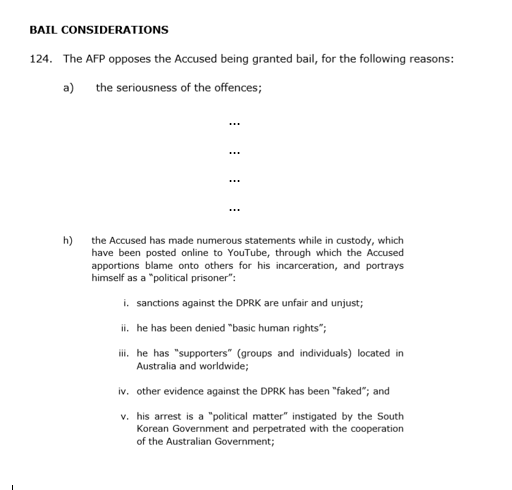
It is not only in response to his bail application that Choi has endured political discrimination. He and his family have been subjected to it from the time of his very arrest. In prison, Choi has had special restrictions imposed on him far in excess of those imposed on convicted murderers and rapists. For the last year, Choi has been banned from making any telephone calls to his friends. The only person that he is nominally allowed to call is his wife. However, the authorities insist that any communication on the phone that Choi makes must be in English. This makes communication between Choi and his wife practically impossible given that her English is very limited and his own English is far from fluent. Earlier this year, two officers from the Corrections Intelligence Group “visited” Choi and threatened that should he speak in Korean on the phone he would be sent to Goulburn Supermax prison. Choi soon found out that he could not communicate with his wife in any meaningful way now and it was risky too – an inadvertent break into Korean could see him isolated in Goulburn Supermax. So that line of communication became completely cut.
To break Choi’s spirit the authorities have gone to great lengths to isolate Choi from his entire family. When Choi was arrested, his adult son’s house was also raided and his son and daughter-in-law subjected to threatening interrogations. Although police did not charge his son they made it clear that any support for, or association with, his father could see him in trouble. Thus, his son has been effectively barred from communication with Choi. Meanwhile, prison authorities also refused permission for Choi to even telephone his daughter-in-law. As a result, since his arrest nearly two years ago, Choi has not been able to speak to, let alone see, his own son, daughter-in law and infant granddaughters. To further try and break Choi’s resolve, Australian regime agencies have had Choi’s son sacked from a senior, skilled role at a reputed IT infrastructure company. The AFP told Choi’s son that he would not be able to work in a professional role again.
Meanwhile, even as he was preparing to enter a plea and then to prepare for his upcoming trial, Australian authorities restricted Choi’s access to his lawyers. Thus, for over a whole year since their initial visit on 11 September last year, Choi’s current lawyers were only able to visit him twice in jail and only on one of those visits were they able to be accompanied by an interpreter. By contrast, Choi’s previous regime-appointed lawyer, who was pressuring him to plead guilty, was able to visit him with an interpreter once a week. It seems that once the regime realised that Choi’s current lawyers were not going to pressure him to plead guilty, they started curbing their access to Choi. So, after not having any problem getting an initial visit to Choi, these lawyers and any interpreters were suddenly required to be vetted for special approval to visit an NSI (National Security Interest) inmate. This approval finally came through less than three months ago – a whole year after they had first visited Choi. The timing of that approval is also rather “interesting” – it happened to be around the time that Choi submitted his motion for a Permanent Stay!
Australian Regime Intercepts Choi’s Communications with His Lawyers
Given the blatant Cold War discrimination that Australian state institutions have subjected Choi to, it is obvious that these same institutions are not going to give Choi a fair trial. Therefore, the grounds that Choi has for a Permanent Stay are both compelling and very numerous. In the hearing last Friday, Choi’s barrister chose to focus on two key grounds. Firstly, he detailed how Choi can have no confidence that his communications with his legal representatives are not being intercepted by state agencies. With such well-founded fears, not only can he not properly plan his own trial defence with his legal representatives, Choi can have little confidence that privileged communication between him and his legal representatives are not being passed on to the Prosecution. Concerned about this, Choi’s lawyers wrote to various government agencies seeking assurances that they have not been intercepting communications between Choi and his legal representatives. However, by the time of the Permanent Stay hearing, ASIO had failed to respond. Meanwhile, the AFP’s response refused to give any assurance, only stating in a non-committal manner that: “The Australian Federal Police (AFP) does not comment on operational matters before the court.”
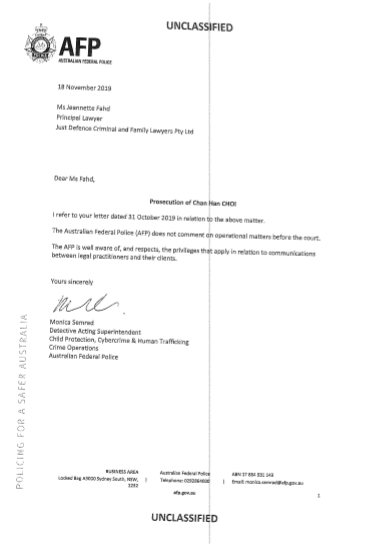
Of all the responses received by Choi’s lawyers from government agencies, the most striking was the 7 November response of the Commissioner of Corrective Services NSW, Peter Severin. In his letter to Choi’s lawyers, which the lawyers submitted as part of their affidavit to the court, the Commissioner of Corrective Services NSW admits that prison officers are indeed intercepting phone calls between Choi and his legal representatives. Severin claims that this is necessary because Choi is an NSI inmate. He tries to divert from this admission by stating that: “correspondence, including faxes and emails from a legal practitioner to a NSI inmate must be delivered to the inmate without opening, inspecting or reading the contents.” However, one can have little confidence that the prisons are actually following even this policy. This is especially the case when one considers what occurred when Choi’s lawyers sent him, by post, several months ago crucial legal documents and evidence. Choi did not receive these documents as they were likely intercepted too!
The Commissioner of Corrective Services NSW (CSNSW) attempts to minimise the significance of their interception of communications between Choi and his legal representatives by claiming that “it is the practice of CSNSW that officers periodically ‘drop in’ to the line, listen for long enough to check that English is being spoken and that the call is with the approved recipient ….” However, even if CSNSW officers were actually confining themselves to such a procedure, they would still be on line long enough to potentially listen in on important legal tactics being discussed between Choi and his legal representatives.
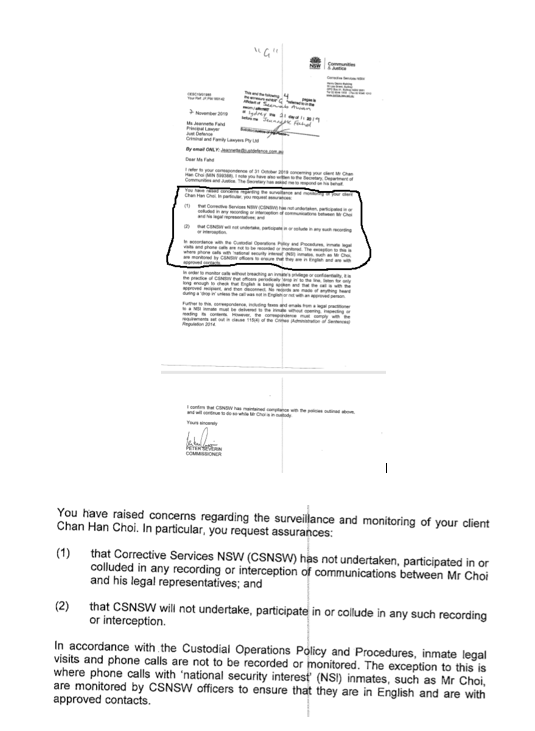
Of course, one would have to be extremely naive to think that state personnel assigned to listen in on communications between Choi and his legal representatives are confining themselves to short bursts of snooping. This is especially when one knows that Australian state agencies have a sordid history of spying on privileged communications between others in order to suit the interests of the capitalist masters that they serve. During Australia’s 2004 negotiations with East Timor over oil and gas resources in the Timor Sea, the Australian Secret Intelligence Service (ASIS) planted huge numbers of listening devices in order to listen to the negotiation strategy discussions of East Timorese ministers and negotiators and thus give the Australian government – and the filthy rich corporate bigwigs of Woodside Petroleum and BHP whose interests they were representing – the advantage in the negotiations. If that is what Australian state agencies do to gain an unfair advantage in a dispute with what it calls a “close friend”, they will surely have no hesitation in snooping in on the discussions between a person accused of aiding what they deem to be a “criminal state” and his lawyers in order to gain the advantage in their prosecution of him.
The other important aspect of the Australian state spying on East Timorese negotiation strategy discussions is the extent to which they went to cover up this snooping. In 2013, as the remorseful ASIS officer (“Witness K”) who led the bugging was set to travel to the Permanent Court of Arbitration in The Hague to expose the operation and to act as a witness for the East Timorese government in its case against the Australian government over the spying, ASIO raided the home of this Witness K and seized his passport thus preventing him from testifying at The Hague. They also raided Witness K’s lawyer, Bernard Collaery. Five years later, the same AFP and Commonwealth DPP that are prosecuting Choi hit up Witness K and Collaery with charges of revealing to the media and the East Timorese government the 2004 bugging operation. Both face charges that could see them imprisoned for years. If Australian regime agencies are capable of such extreme measures to cover up their spying of those that they are in dispute with, they would not blink an eyelid to simply lie to cover up the extent of their spying on the privileged communications between Choi and his lawyer.
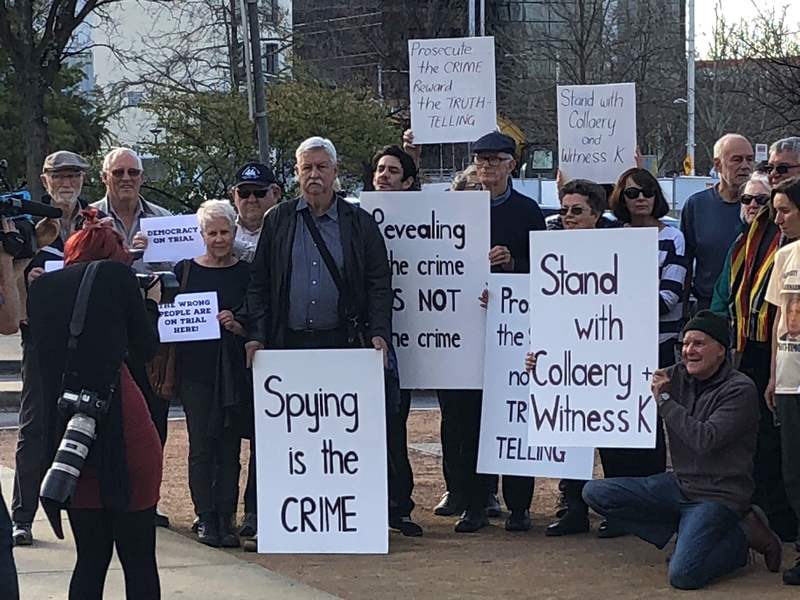
12 September 2018, Canberra: People protest the Australian state’s persecution of “Witness K” and his lawyer Bernard Collaery for revealing to the world that Australia’s ASIS spy agency had spied on East Timorese ministers and negotiators to give the Australian government an unfair advantage in oil negotiations with East Timor. If Australian regime agencies are capable of such extreme measures to cover up their spying on supposed “friends” that they are in dispute with, they would not blink an eyelid to simply lie to cover up the extent of their spying on the privileged communications between Choi and his lawyer.
The second main ground that Choi’s barrister focussed on in last Friday’s hearing is the difficulty that his legal representatives face in preparing his defence because of restrictions blocking interpreters communicating with Choi. Choi can roughly speak some colloquial English. However, his English is far from adequate to understand complex legal concepts and legal evidence when presented in English. He needs Korean-English interpreters to communicate with his lawyers and barristers. However, CSNSW have determined that any interpreter visiting Choi or even interpreting in an Audio-Visual Link (AVL) connection with him must have special clearance for contact with NSI inmates. The problem is that none of the Korean-English interpreters available have NSI clearance and none of the regular interpreters want to go through the process of getting approval (it is time consuming and intrusive). Although a non-regular interpreter with clearance was later found, when she was used for a 21 November conference between Choi and his lawyer and barrister, she was unable to communicate chunks of what was being communicated to Choi from English to Korean. There were many English words that she simply did not understand. Midway, through the conference, the interpreter said, “I will contact the agency as I do not understand this. This is too serious and hard for me. I am only Level 2. I will let the agency know next time they should send someone more advanced in English for this matter.” Except the agency has no one else with NSI clearance or willing to seek it! We will not name the interpreter involved as she is an innocent thrown in the deep end as a result of a draconian system to keep Choi and others like him isolated. However, the long and short of the matter is that Choi and his legal representatives are unable to properly prepare his legal defence because they cannot access the interpreters needed to adequately communicate with each other.
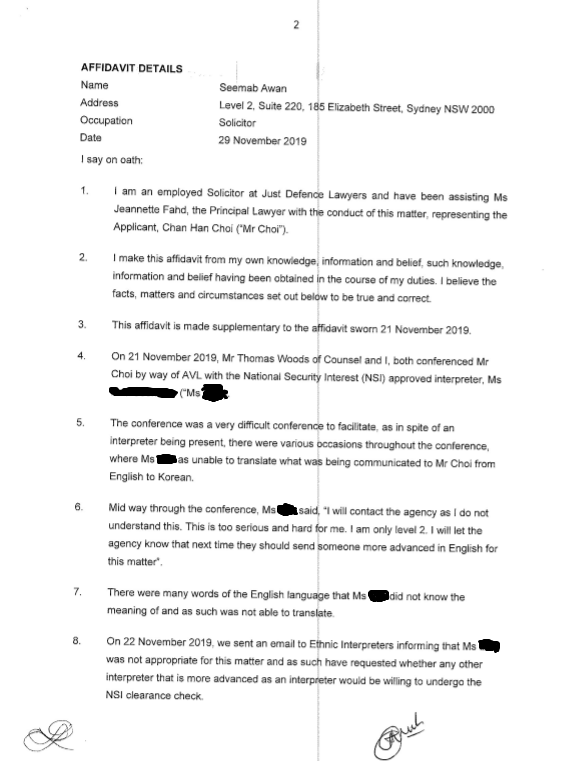
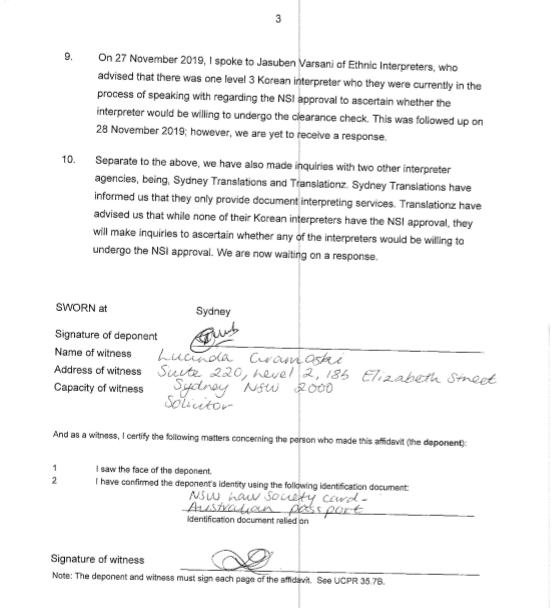
All this is compounded by the fact that funding granted by Legal Aid for interpreters in Choi’s matter has been extremely limited. This is almost certainly no accident. It bears an eerie resemblance to what is going on in another case of political persecution – that of Witness K. In late August, Witness K’s counsel angrily announced that his client had received almost no funding from Legal Aid despite having applied for it more than a year previously! Witness K’s counsel, Haydn Carmichael, accused Legal Aid of an “extraordinary unexplained roadblock.”
Even If Choi Gets Bail in the Future He Still Can’t Get a Fair Trial
During last Friday’s hearing, the sitting judge intimated that should Choi be able to get bail in the future following a fresh application, the issues raised in his Permanent Stay application would be resolved. However, this is definitely not the case. The issue of getting interpreters to speak to Choi would be partially resolved in that they would no longer be obstructed from contacting him. However, the problem of inadequate Legal Aid funding to hire interpreters would not go away one bit. More importantly, Choi would still face the threat of having his communications with his legal representatives intercepted. Let’s recall that ASIO and the AFP have both refused to give assurances that they are not even now intercepting Choi’s communications with his lawyers and barristers. And given that Corrective Services NSW is openly admitting to intercepting Choi’s communications with his legal representatives, one can have little confidence that other government agencies would not do this even if Choi is granted bail. After all, the Australian capitalist regime’s perception of Choi would not change one iota if he is granted bail in the future. Given that they believe that his communications with his legal representatives should be intercepted now, they would still believe that they should be intercepted in the future. It is instructive to again recall what an Australian state agency did in East Timor a few years ago. They did not merely bug phone calls amongst East Timorese politicians and negotiators. Instead, under the cover of an aid project to refurbish government buildings, the Australian regime planted hundreds of listening devices in East Timorese ministerial and government buildings. If they are prepared to undertake such a massive, complex and expensive operation abroad against a “friendly country”, they would not hesitate, even in the least, to plant a couple of listening bugs and phone wiretaps in the future bail residence of a person who they believe is politically loyal to a country they deem a “criminal state.”
Moreover, we already know for certain that Australian state agencies have placed Choi’s supporters under intensive surveillance. Point 124.J of the AFP’s Statement of Facts states that:
several members who attended the rally specified in (i) [the 13 April 2019 Free Chan Han Choi rally that the AFP report on – actually complain about – in their previous point], have visited and been in regular telephone contact with the Accused while in NSW Corrective Services custody. Several of these member [sic] have attended NSW Central Court on dates where the Accused appeared for mention. On one occasion (4 July 2018), one of the Accused’s associates removed their business shirt while in Court to reveal a t-shirt containing the words “See You in Pyongyang”, positioning themselves to feature on a video-uplink with the Accused.
There are three key points apparent from this statement. Firstly, to be able to determine that amongst the dozens of people attending the 13 April 2019 united front rally in defence of Choi are the three people visiting Choi in custody, the AFP and/or ASIO and/or other regime agencies must have placed the 13 April 2019 protest under surveillance and must also have specifically honed in on the people allowed to visit Choi. Secondly, to be able to determine that some of these people have “been in regular phone contact with the Accused” (actually they should have said “had been” since for the last year Choi has been barred from phone contact with these friends), regime agencies must have been monitoring Choi’s calls to them. Thirdly, given the position that Choi’s supporter (who we spoke to) was sitting in the court room on 4 July 2018, there was no way that any AFP/ASIO officers present at the court room that day could have by their own eyes determined that, “one of the Accused’s associates removed their business shirt while in Court to reveal a t-shirt containing the words `See You in Pyongyang’, positioning themselves to feature on a videouplink with the Accused.” They could only have determined what “one of the Accused’s associates” was trying to do by listening in on phone communications amongst Choi’s supporters.
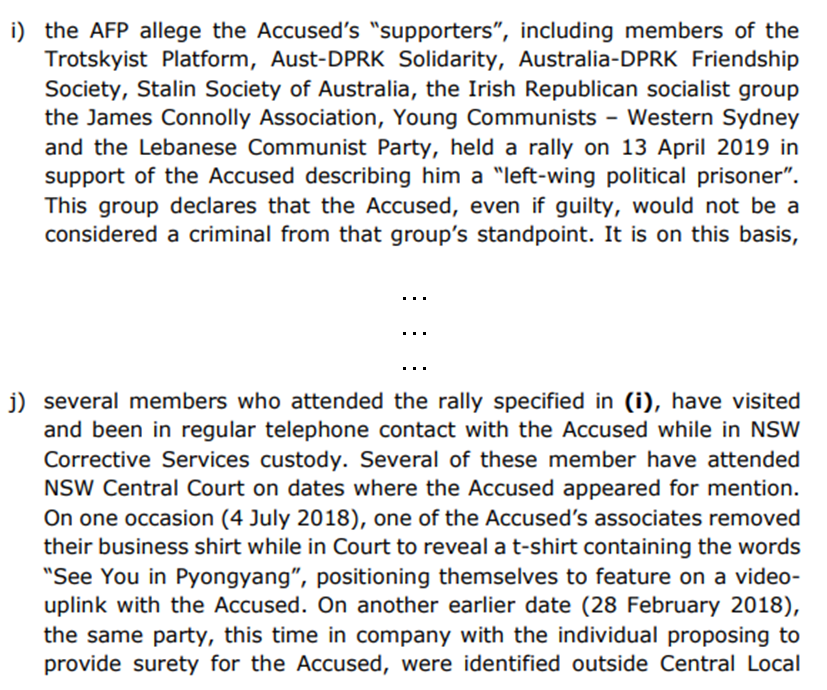
The level of surveillance of Choi’s supporters by the Australian regime is further emphasised in Point 20 of the Crown’s 10 October 2019 submissions opposing Choi’s bail application. It states that:
On two occasions when the Applicant’s matter has been before Central Local Court for mention, supporters have attended with one of them wearing a t-shirt bearing the flag of the DPRK above the words “See you in Pyongyang” which was displayed prominently (the first time, in the foyer of the court; the second time, in the body of the court during the mention of the matter) and then covered up. On the first occasion, those supporters also photographed the outside of the court including members of the Prosecution who were walking down the steps and then immediately attending an internet café before splitting up.
Choi’s supporters who were involved in this highly “subversive” act of “wearing a t-shirt bearing the flag of the DPRK” and then “attending an internet cafe” immediately after attending court said that they were in the Internet cafe and then talked together outside for a combined period of over an hour before “splitting up.” That means that the AFP/ASIO officers who stalked them not only tailed them the hundreds of metres from the court to the internet cafe but also carried out surveillance on them for over an hour!
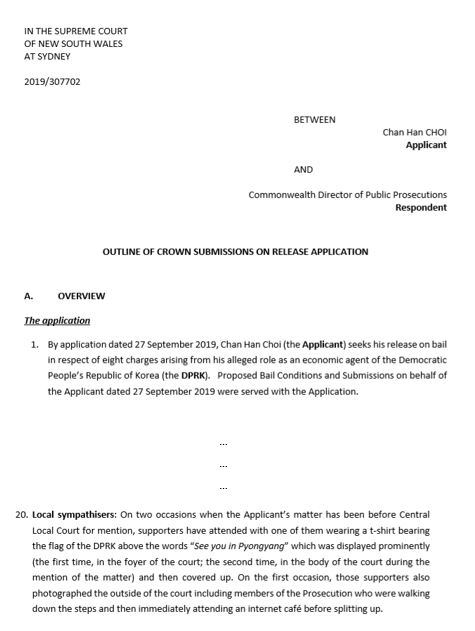
So, we can draw from these two statements by the AFP and the Commonwealth DPP the following conclusions about the level of Australian regime surveillance of Choi’s supporters:
- Australian regime agencies have stalked Choi’s supporters and on at least one occasion monitored them for over an hour.
- Regime agencies carried out surveillance on at least one solidarity rally with Chan Han Choi and honed in on those supporters of Choi visiting him in custody.
- Regime agencies have monitored the phone calls between Choi and his friends.
- Regime agencies have listened in on phone communications amongst Choi’s supporters.
If this is the level of surveillance that the regime is placing on Choi’s supporters, what would they be doing to Choi himself should he get bail? They would certainly be intercepting all his communications – including with his lawyers and barristers.
There is another crucial point that should be made here. Because of the obstruction of access to Choi for lawyers and language interpreters, Choi has had to rely on his supporters visiting him in prison to act as go-betweens with his lawyers. Indeed, his access to lawyers and the necessary interpreters became so constricted that on 28 July of this year, Choi formally wrote a signed document to make one of his supporters (who we will refer to as Comrade P) his Power of Attorney. This Comrade P is one of the people referred to in the AFP’s Statement of Facts who both attended the 13 April 2019 Free Chan Han Choi rally and has been visiting Choi in custody. He is also the person the AFP refer to who on 4 July 2018, “removed their business shirt while in Court to reveal a t-shirt containing the words `See You in Pyongyang’, positioning themselves to feature on a videouplink with the Accused” and is also one of Choi’s supporters who the Prosecution’s 10 October 2019 submission reveals was stalked [by Australian/spy agencies] to an internet cafe. The key point is that since, as is evident from the AFP and Commonwealth DPP’s own submissions, Australia’s state agencies are intercepting the communications of – and putting under surveillance – Comrade P and other Choi supporters, these regime agencies are effectively intercepting Choi’s indirect communications with his lawyers. This is especially the case since 28 July when in legal terms the person that Choi made his Power of Attorney, Comrade P, effectively became Choi as far as consultations and instructions to lawyers are concerned. By intercepting this Power of Attorney’s communications, which no doubt means his communications with Choi’s lawyers too, the Australian regime are again intercepting communications between Choi and his lawyer.
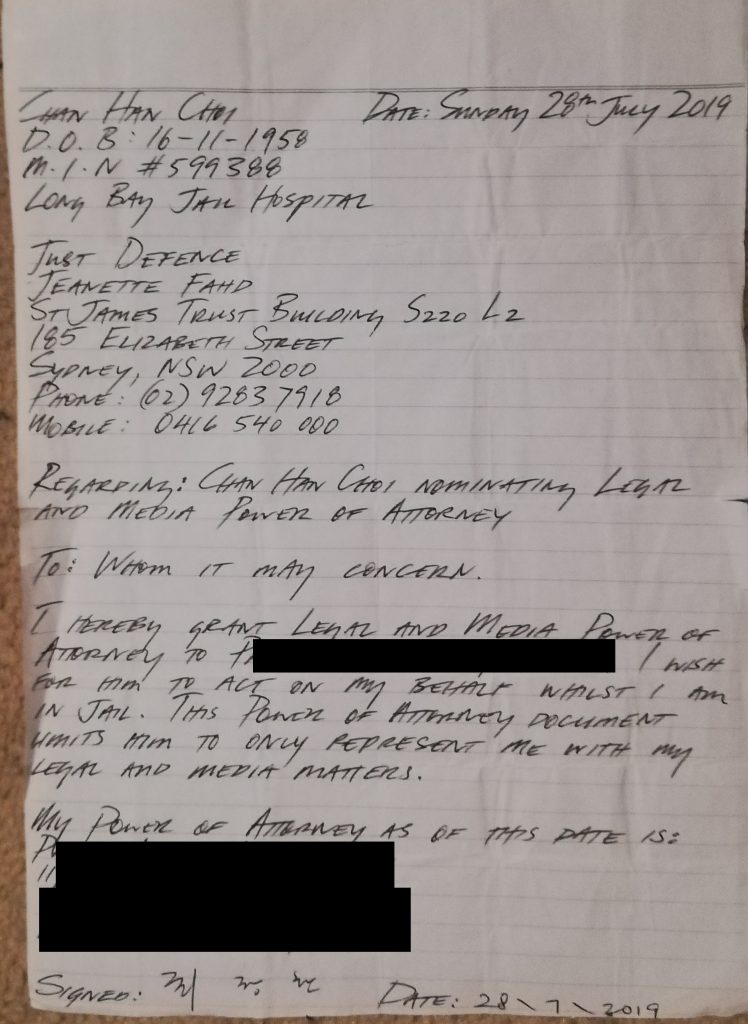
In summary, whether it is Choi’s direct communications or his indirect ones via his supporters – and in particular the person he made his Power of Attorney – communications between Choi and his lawyers, that are meant to be privileged, have been intercepted by the agencies of the very state that is prosecuting him. There is thus no way Chan Han Choi can get a fair trial! Even if he was in the future finally granted bail and through some miracle the Australian regime stopped spying on him, they may well have already determined enough information about his intended legal strategy to compromise his defence. As an analogy, consider the Australian intelligence agencies spying on East Timorese officials. The key point that the Australian regime wanted to find out in order to gain the advantage in the oil and gas negotiations, is what East Timor’s bottom line was, i.e. how low they were prepared to settle for. Once they had this information then it would not matter if the spying stopped; Australia would already have a huge unfair advantage in the negotiations. Similarly, once key aspects of Choi’s legal strategy have been determined by the Australian regime through spying, the damage is already done: any (quite hypothetical) ceasing of the spying is not going to reverse the unfair advantage already gained by the prosecution.
But Wait … There’s More!
The main affidavit submitted by Choi’s lawyers to his Permanent Stay hearing included a copy of a 1 November 2018 letter by Legal Aid to Choi threatening that should Choi sack his current lawyers, his “grant of legal aid will be terminated.” Except, as the affidavit stated, “at no stage did he [Choi] communicate with legal aid about wishing for the grant to be assigned to another lawyer.” Although the affidavit itself does not draw any conclusions from this, this fact has much significance. For, since it was not Choi that tried to sack his lawyers and given that Legal Aid was against Choi supposedly sacking his lawyers, it is apparent that a shadowy third party masquerading as Choi sent Legal Aid a phoney communication sacking Choi’s lawyers. Who could this third party be? We cannot be sure. However, to pull off something like that and fool Legal Aid those responsible would almost certainly have been a state actor. It is obvious that they were trying to ensure that Choi would not be represented by his current lawyers. They no doubt hoped that given that Choi was so isolated in prison and communication with him so impeded, a mere forged letter to Legal Aid in Choi’s name would have been sufficient to end these lawyers’ representation of him. So, what would their motivation be for doing this? Prior to Choi retaining his current lawyers, Choi had a government-appointed lawyer who was pressuring him to plead Guilty. In contrast, Choi’s current lawyers were intent on allowing Choi to make the ultimate decision on how he should plead and leant towards recommending that he fight the charges. So, whoever tried to get Choi’s lawyers sacked were obviously enemies of Choi and the DPRK who wanted to see him plead Guilty. That as good as narrows it down to either Australian regime agencies like ASIO or the AFP or to the CIA or the South Korean intelligence agency, the KCIA.
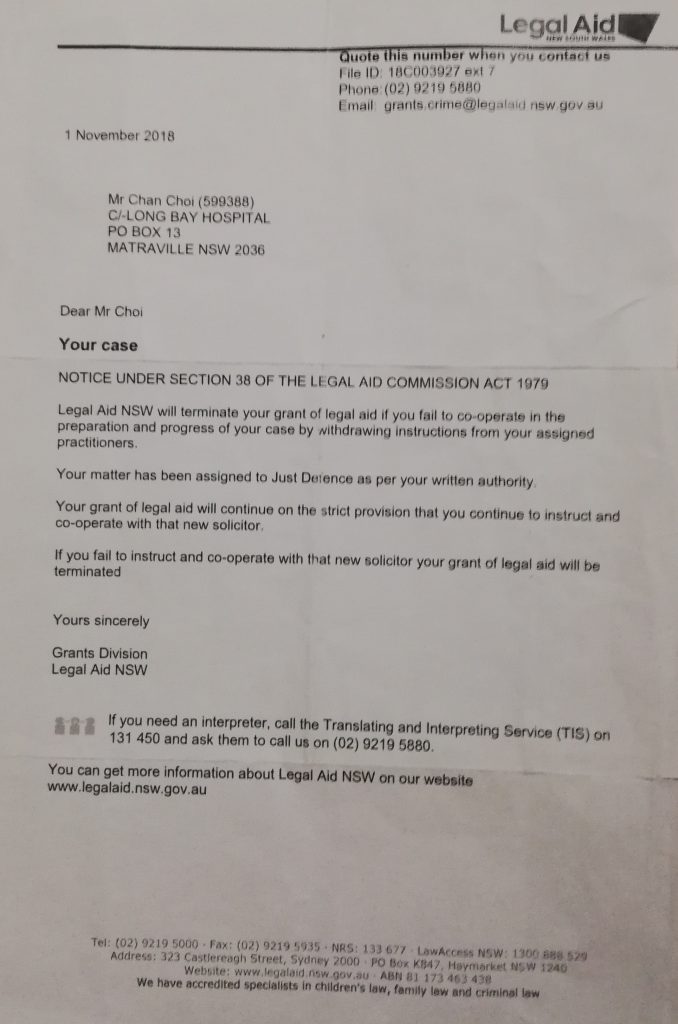
November 1, 2018 letter by Legal Aid to Choi threatening that should Choi go ahead and sack his current lawyers, his “grant of legal aid will be terminated.” Except, at no stage did Choi ask to sack these lawyers! Since it was not Choi that tried to sack his lawyers and given that Legal Aid was against Choi supposedly sacking his lawyers, it is apparent that a shadowy third party masquerading as Choi sent Legal Aid a communication sacking Choi’s lawyers.
This is hardly the only time that Choi’s adversaries have used dirty tricks methods to try and isolate him. Take the way that CSNSW have attempted to obstruct visits from Choi’s friends. When the three friends visiting Choi in prison first applied to visit him in early March last year – a detailed application was required as the authorities had classified Choi in the most stringent prisoner category (EHR-R/NSI) – CSNSW told them that it would take four to five weeks to process their applications. When they did not receive any feedback by the end of this period, they called CSNSW’s Visits Restrictions Unit on two occasions over the following weeks to find out the status of their applications. On each occasion they were told that their applications were being processed and a decision would be forthcoming soon. However, when they called a third time, now some seven weeks after their applications were lodged, the CSNSW unit now told them that … there was no record whatsoever in the CSNSW system that any of them had made any applications! Fortunately, Choi’s friends each had copies of their own applications and each of these was witness signed by a CSNSW officer. Nevertheless, the supposed “loss” of their applications was used to slow down the processing of these applications. Indeed, these supporters of Choi were not informed that they had been approved to visit Choi until four and a half months after their initial applications! Moreover, CSNSW only began to inform them that their applications had been successful after one of them sent an E-mail inquiring about the status of their applications. CSNSW responded to that E-mail by E-mailing a copy of a postal letter, dated three weeks earlier, informing the applicant that his application to visit Choi had been successful. However, the address on this letter was wrong: the unit number in the address was written as 1 instead of 11. As a result, the letter sent in the post was never received. Meanwhile, another one of the applicants also never received any letter in the post informing him that his application had been successful. If all that is not enough, after two of these friends in April simultaneously applied to have their visits to Choi extended for a further year (after all the hassle to get approved CSNSW only grants successful applicants a one year period of visitation!) one of them (Comrade P) was again told, when he inquired with the relevant CSNSW unit a month after his application was lodged, that “we have not received any paperwork from LBH [Long Bay Hospital]”! This is despite the other friend of Choi who applied together with this friend – and whose application was indeed witness signed by the same CSNSW officer at the very same time – not having his application lost. Now, one could possibly put one of these “errors,” that delayed Choi’s supporters from getting access to him, down to bureaucratic incompetence. But for all these “mistakes” to occur is simply not possible unless there was a conscious effort by relevant units of CSNSW to use dirty tricks to impede visits to Choi by his supporters.
The fact that dirty tricks were apparently used by an Australian regime institution to try and keep Choi isolated from his supporters adds further weight to the conclusion that forces hostile to Choi had used dirty tricks to try and have his current lawyers sacked. This has much significance for assessing whether Choi can get a fair trial. For, if Australian state agencies – and possibly allied foreign intelligence agencies – are prepared to violate their own stated rules to isolate Choi from both supporters and legal representation, then how can this same state conduct a fair trial of Choi? It can’t! Moreover, the fact that this capitalist state – and possibly allied foreign intelligence agencies – are prepared to use under-handed methods against Choi reinforces the notion that the direct and indirect communications between Choi and his lawyers that are being intercepted by regime agencies could be used to greatly disadvantage Choi in his upcoming trial.
Also included in the main affidavit submitted to Choi’s Permanent Stay hearing is a media report that includes the public statements made by then prime minister Malcolm Turnbull at the time of Choi’s arrest. Turnbull as good as pronounced Choi guilty, threatening anyone thinking of assisting North Korea that “the AFP [Australian Federal Police] will find you” and then ranting hysterically in connection with Choi’s arrest that, “North Korea is a dangerous, reckless, criminal regime threatening the peace of the region. It supports itself by breaching UN sanctions, not simply by selling commodities like coal and other goods, but also by selling weapons, by selling drugs, by engaging in cyber crime.” Needless to say, when the then chief political officer of the country makes such highly publicised, extreme statements against Choi it is going to prejudice any jury that will sit on Choi’s trial.
There were also many additional reasons why Choi cannot get a fair trial that were not included in the formal Permanent Stay application. One of these is that the AFP or their sources (which could be ASIO, the Australian Signals Directorate, the CIA or the KCIA) apparently tampered with evidence submitted in the case. The apparent tampering of submitted documents does not directly affect the case against Choi. Rather, it covers up information that is extremely politically damaging to the Australian and U.S. regimes and even more destructive to the credibility of their South Korean allies (see below for further details). However, it shows that the evidence supplied in the case cannot be relied on. After all, if the AFP or their sources have secretly deleted politically embarrassing information (without putting any note stating that the information is redacted) from documentary evidence in one area, what other evidence have they tampered with? How can Choi get a fair trial if one can have little confidence in the authenticity of the evidence supplied in the case against him? In the next few weeks, we hope to be able to confirm with absolute certainty if there has been under-handed tampering of documents in the prosecution’s supplied evidence as almost certainly seems to be the case. Watch this space!
When one puts the numerous grounds for a Permanent Stay in the proceedings against Choi together, one gets a unified picture of why Chan Han Choi cannot get a fair trial. And this is because, from the prejudicing of any jury by the extremely hostile public statements against him made by the then prime minister at the time of his arrest, to the impeding of Choi’s access to lawyers, to the restriction of access to this very day of competent Korean-English interpreters, to the very limited and tardy legal aid funding for interpreters, to the efforts to break his spirit by blocking communication with his family, to the interception of Choi’s privileged direct and indirect communications with his legal representatives, to the apparent dirty tricks used to try and isolate Choi from both his lawyers and his supporters, to the denial of his bail application based on his political sympathy for the socialistic DPRK, Chan Han Choi has, because of his political loyalty to a socialistic state, faced blatant discrimination from the agencies of Australia’s capitalist state – the very state that is supposed to “fairly” adjudicate his case. If Choi’s Permanent Stay application was indeed adjudicated on fairly it would surely have succeeded.
However, the legal system that adjudicated on Choi’s Permanent Stay application is itself biased. As Trotskyist Platform spokesman, Samuel Kim, put it at a 23 November march through the centre of Sydney demanding freedom for Chan Han Choi:
“… this so-called justice system, is not just, it is unjust. The legal system at its core, is part of the ruling class’ machinery that works against the interests of the working class masses and their supporters. The state exists for the corporate bosses and capitalist investors… Whether it is the Liberals, the ALP or the Greens who are in office, it will always be a state for the capitalist rich ruling class.”
That is why business owners, from corporate bigwigs to restaurant and cafe owners – big and small alike – are able to get away with illegally underpaying their workers without facing any criminal punishments (and at most being hit with minor fines), while trade unionists who stand up staunchly for workers rights get hit with criminal convictions and exorbitant fines. This legal system that attacks those who stand up for the rights of workers is even more implacably hostile to those like Choi who stand up for workers states like the DPRK and the Peoples Republic of China (PRC). Meanwhile, since the courts are united with the other agencies of Australia’s state – the police, the military, the AFP, ASIS, ASIO, the DPP, the Australian Signals Directorate and the prisons – by a common subservience to the same wealthy capitalist class they also act as apologists for these other state organs. This was evident in a high-profile coroner’s report handed down exactly a week before Choi’s Permanent Stay application was held. The coroner’s report was into the death of 26 year-old Aboriginal prisoner, David Dungay. Dungay was killed by six prison guards four years ago at the very jail and the same wing of that jail where Choi is currently being held: the Hospital wing (which also serves as a remand jail) of Long Bay Prison. The guards caused Dungay’s death by crushing him with their combined weight and then continuing to choke him in this prone position as he cried out desperately more than a dozen times, “I can’t breathe!” Outrageously, the coroner recommended no criminal charges or any other sanction against any of the CSNSW officers who caused Dungay’s death. Similarly, the NSW Supreme Court judge who heard Choi’s Permanent Stay application grossly downplayed the harm done by the actions of CSNSW and the other regime agencies that have been violating the rights of Chan Han Choi.
Chan Han Choi’s Fate Will Be Decided by the
Outcome of the Clash of Political Forces
Like the other enforcement personnel of the capitalist state, magistrates and judges are tied by thousands of threads to the wealthy capitalist class. Magistrates and judges are themselves on very high salaries. Many of them no doubt invest part of these salaries in large shareholdings, in wealth management products indirectly investing in shares and in multiple investment properties. That means that their own economic interests lie very much with the interests of capital and against those like trade unionists who militantly stand up for workers rights. Having such interests would also make them especially hostile to states – like the DPRK – formed through the overthrow of capitalist rule. Moreover, a person could not rise to become a judge – especially a Supreme Court judge – unless they had already proven their loyalty to the capitalist order countless times on their way up. Then there are all the personal connections that tie the judiciary to the capitalist elite. Judges’ and magistrates’ connections to corporate bigwigs, ruling class politicians and the leaders of other state agencies are cemented through private school old boys networks, common membership of exclusive social and sports clubs, marriage, neighbourly relations in expensive suburbs and, in some cases, even through shared patronage of the same high-priced prostitutes.
We must add that in such high-stakes, high-profile, political cases like the one of Chan Han Choi’s, any judge sitting on the case is hardly going to make any key decisions by themselves. You can bet that influential capitalist billionaires, government leaders, heads of repressive agencies and other judges will be banging in their ears. Such interference in the case might take place casually during the course of, say, an extravagant dinner at an expensive restaurant. Or it might occur in a more deliberate manner through members of the ruling class elite specifically calling up the relevant judges or taking them “aside for a chat.” Think of how prime minister Scott Morrison rang up his mate – and former neighbour – NSW Police Commissioner, Mick Fuller to “enquire” about the police investigation into the alleged forging of documents by his energy minister, Angus Taylor … and multiply that by about a hundred!
Since the Australian ruling class is determined to persecute Chan Han Choi, the pressure on the judge – and his own class instincts – will be toward ensuring that this occurs. However, that does not mean that Choi’s cause is hopeless. Choi has his support. When the Australian authorities arrested Chan Han Choi nearly two years ago, Australian ruling circles expected that Choi’s imprisonment would meet with universal approval and that they could break Choi’s spirit by cruelly impeding his access to family, friends, lawyers and Korean-English interpreters. Instead, Chan Han Choi has defiantly spoken out from prison against the Australian regime’s violation of his human rights and has stuck by his political opposition to the cruel economic sanctions on the people of North Korea. What has really caught the Australian regime by surprise is the significant and growing support for Choi that has arisen both in Australia and around the world. Here in Sydney, Trotskyist Platform has been joined in the united front rallies to free Chan Han Choi and oppose the economic sanctions by a growing number of people. Among the organisations endorsing the street protests are groups as diverse as the Irish republican socialist group the James Connolly Association, Australia-DPRK Friendship Society, the Lebanese Communist Party, Communist Party of Australia – Western Sydney Branch, Aust-DPRK Solidarity, Young Communists – Western Sydney and most recently the Social Justice Network, a multi-racial progressive group with a strong base amongst refugees and migrants from the Middle East and South Asia. Alongside the street protests in defence of Choi, his supporters, from Australia to as far away as Genoa, Italy have been making and wearing T-shirts calling to “Free Chan Han Choi – A Socialist Political Prisoner in Australia.” Other individuals and groups have expressed their solidarity with Choi on social media. Despite Choi’s supporters in Sydney facing intimidation and surveillance from the repressive agencies of the Australian regime, just prior to Choi’s Permanent Stay hearing we held our fourth street demonstration in solidarity with Choi. Six days earlier, we boisterously marched through the streets of Sydney city chanting, “Chan Han Choi – Free This Hero Now!” and “Free Chan Choi – Lift the Sanctions Now!”

What this solidarity movement means is that the more the Australian regime continues with its persecution of Choi, the greater the political cost it will suffer. Its pretensions of being “democratic” will be exposed, the cruelty of the sanctions regime on the DPRK that it supports will be highlighted and the nature of the Australian regime as a dictatorship of the big end of town will be bared for all to see. In the end, influential members of the capitalist ruling elite will have to decide whether their hostility to Choi and what they gain in persecuting him is worth the political cost of conducting this persecution. In other words, Chan Han Choi’s fate will mostly not be decided by points of law and evidence presented in the courtroom but by the clash of forces in the political arena. The more that we can increase the political cost of attacking Choi for Australia’s racist rich people’s regime the more chance we have in forcing them to back off from their completely unjust persecution.
Why the Ruling Class Is So Hell Bent on Persecuting Chan Han Choi
As Choi has himself told his supporters, the ferocity of the Australian rulers’ persecution of him represents a channelling of all their hostility to the DPRK onto Choi. So why is the Australian regime so hostile to the DPRK? To the imperialist ruling classes of the likes of the U.S., Australia and Japan the existence of states created by anti-capitalist revolutions in the DPRK and in its massive neighbour and ally China (as well as in Cuba, Vietnam and Laos) are simply unbearable. For the existence of these socialistic states means that there is a chunk of the world where these imperialists cannot exploit workers, plunder natural resources and dominate markets the way that they do in most of the rest of the world. Moreover, the imperialists fear that the existence of independent, socialistic countries in the Asia-Pacific could embolden the masses of the countries in this region bullied by capitalist powers to think that they too should give the imperialists the boot and take up the socialist path. The Australian imperialists fear that if the PRC continues to grow stronger and if the DPRK is allowed to do so, the masses of PNG, East Timor, Fiji, the Philippines and Indonesia will be encouraged to defy their Australian neocolonial oppressors. Furthermore, the mere presence of workers states sets off the most mortal fear of capitalist rulers: that their own working class will be inspired by this to one day sweep them away from power.
The capitalist rulers have specific reasons for wanting to persecute Chan Han Choi. For one, by prosecuting Choi on charges of violating the sanctions on the DPRK, the Australian rulers hope to intimidate anyone thinking of assisting the people of North Korea. Alongside its U.S. senior partner, the Australian imperialists have been amongst the most rabid supporters of the sanctions. Australian ships and maritime surveillance aircraft are currently deployed in the waters off Korea helping the U.S. to enforce these sanctions. These sanctions are aimed at arm-twisting the people of North Korea to kowtow to the imperialist powers, abandon their socialistic system and allow Western, Japanese and South Korean speculators, bankers and sweatshop bosses to take over her economy, plunder her natural resources and turn her well educated workforce into a big labour pool to be exploited. For the capitalist ruling classes of the U.S., Australia and Japan, the terrible hardships and shortages of medicine and food that the sanctions inflict on the people of “North Korea” are just “collateral damage” in the pursuit of their “higher” purpose of … greater profits!
The Australian regime’s arrest and demonisation of Choi was also aimed at fuelling the launch of their new Cold War witch hunt against supporters of socialistic states. Choi’s arrest came just as the main weapons in this latest Cold War were being set for blast off. The number one target of this Cold War – which has seen the mainstream media and government launch one anti-China attack after another – are supporters of socialistic China. Any Chinese international student who speaks out in support of the PRC and any prominent Chinese immigrant who refuses to condemn the PRC could get witch-hunted. However, supporters of the DPRK – which is the PRC’s ally and neighbour – like Choi are also naturally targeted. The persecution of Choi has both added to the anti-communist hysteria targeting supporters of Red China and has been in turn bolstered by this anti-PRC Cold War. Just four days ago, the Morrison government announced the granting of yet more tens of millions of dollars for ASIO so that this sinister spy agency could establish a new taskforce against supposed [mythical] “foreign interference” by China. Pro-communist activists, pro-PRC Chinese international students and other supporters of Red China will be the real target.
The purposes behind this anti-communist witch hunting are to justify to the public increased military mobilisation behind the U.S.-led war drive against the PRC and DPRK, to justify support for anti-communist forces within China – like the pro-colonial, rich kid rioters in Hong Kong – and to crush opposition at home to the Australian regime’s anti-PRC policies. The effect of this Cold War drive has been to whip up a national security obsession so intense that it has ended up targeting people who are in no way supporters of socialistic states. Thus, although Witness K is certainly no red, the Cold War-derived national security fixation has certainly rebounded against him. So even though Witness K was first raided by ASIO in 2013, the Commonwealth DPP only actually decided to charge him in mid-2018, six months after the arrest of Choi and as the witch hunt against supporters of Red China was quickly intensifying. Many others have also been submerged in the national security tide. These including David McBride, the military lawyer who exposed horrific war crimes by Australian special forces troops in Afghanistan. Even mainstream journalists, who have done so much to whip up the anti-China hysteria, have been subjected to AFP raids on the rare occasions that they actually do a decent investigative report that holds Australian regime institutions to account.
Parallel with the Cold War witch hunt that has targeted Chan Han Choi and pro-Red China Chinese students and migrants has been increased persecution of trade unionists. Anti-union laws have curtailed the right to strike and have led to repeated fines and prosecutions of scores of representatives of construction workers’ unions. Despite a recent parliamentary setback, the right-wing Coalition government continues to try and push through its Ensuring Integrity Bill, extreme legislation that will make it easier for the government to deregister militant trade unions and drive out staunch unionists from leadership positions. It is little surprise that Cold War witch-hunting and union-busting are going hand in hand. That is what happened in the last Cold War against the Soviet Union too. Both attacks on workers’ economic defence organisations – like our trade unions – and attacks on workers states are driven by the interests of the capitalist ruling class. And the more that the capitalist system is unable to ensure secure, permanent jobs for workers, the more that it can’t provide affordable rental accommodation and rising wages, the more we see that the ruling class fears the presence of both militant unions and socialistic states. That is why it is in the interests of the entire workers movement to oppose the Cold War anti-communist witch-hunting. Let us demand: Down with the attacks on our unions, down with the attacks on supporters of socialistic states! Stop the persecution of pro-Red China Chinese immigrants and international students! Stop the persecution of Chan Han Choi – free him now! Dump the anti-“foreign interference” laws and taskforces!
Fraudulent Nature of “Rule of Law” in “Liberal-Democratic” Australia
Gets Exposed
In pursuing their persecution of Chan Han Choi, Australia’s capitalist rulers are paying a considerable political price. Due to his own defiant statements from prison (see for example: https://www.youtube.com/watch?v=wTlumqtaguo) and the efforts of his growing band of supporters, more and more people are hearing about the harsh conditions of Choi’s imprisonment. As a result, an increasing number of people are seeing the hypocrisy of the ruling class’ claims to run a “liberal-democracy” committed to “human rights.” Meanwhile, the fact that the Prosecution successfully opposed his bail in good part based on his stated political sympathies for the DPRK – as opposed to just his alleged deeds – has helped to shatter the myth that Australia is a country where everyone is treated equally before the law regardless of their political allegiances.
All this hurts the ruling class’ predatory machinations abroad. Like its U.S. senior partner, the Australian ruling class often uses the guise of defending “human rights” to intervene in countries abroad. In particular, they cynically wield the club of “human rights” to attack socialistic China and the DPRK itself. Right now Australia’s rulers, including prime minister Scott Morrison, are berating China for allegedly violating the rights of an Australian detained in China on espionage charges, Yang Hengjun. Recently, Yang’s supporters have made many unsubstantiated claims that have been reported as fact by the mainstream media. Yet, the truth is that Chan Han Choi has faced far harsher conditions than what is actually confirmed about the detention of Yang Hengjun. Yang has been restricted by China’s authorities for the last 11 months, while Chan Han Choi has been imprisoned for the last 24 months without going to trial. Notably, while Yang Hengjun spent the first six months that he was held in the comparatively comfortable conditions of house arrest (he was only moved to a detention facility in mid July), Choi has spent the entire 24 months imprisoned in harsh conditions in various Sydney prisons, the last 20 months of which has been in one of the Australian regime’s most notorious prison camps, Long Bay jail. Australia’s foreign minister, Marise Payne, has accused China’s authorities of restricting Yang Hengjun’s access to lawyers and family. Yet Yang Hengjun has at least been allowed regular visits by Australian embassy officials and his court appointed lawyer. However, Chan Han Choi, following an initial visit from a lawyer soon after his arrest, underwent an approximately 50 day period when he was prevented from having visits from anyone at all – whether they be lawyers, family or friends. And until just three months ago, Choi’s access to his lawyers was largely obstructed and his access to competent language interpreters remains effectively blocked to this very day. Of course, we should note that there is no equivalence in the political essence of the cases of Yang and Choi. Yang is accused of espionage against the Peoples Republic of China, which if true is a crime against a workers state that deserves stiff punishment. Even if he turns out to be innocent of the accusations he is no hero whatsoever. In contrast, even if the accusations against Choi turn out to be true, this would only make Choi an even greater hero. For it would mean that he has taken great risks to both help a people battered by cruel sanctions and to stand by a workers state based on public ownership – thus standing by the interests of the more than 90% of Australia’s and the world’s population whose interests lie in the success of socialistic states.
Choi’s continued opposition to the UN sanctions on North Korea in his brave statements from prison and the solidarity movement defending him have combined to invigorate opposition to these sanctions within Australia. Thus, although the Australian regime hoped to use the arrest and demonisation of Choi to justify these imperialist sanctions, the movement against this persecution has actually resulted in there now being more understanding of the cruelty and injustice of these sanctions amongst politically aware working class activists than there was previously. Indeed, as a result of discussions with Choi, who is known affectionately as “Uncle Choi” amongst fellow prisoners, even some inmates at Long Bay jail now see the unfairness of these sanctions.
Moreover, Choi’s persecution, his statements from prison and the impact of the movement defending him have all combined to give some leftist and union activists a better understanding of the DPRK. This, actually, began to take place when Choi was first arrested. Politically astute people who had previously been swayed by the intense media propaganda against North Korea asked themselves, why would a person who grew up in capitalist South Korea and who has then lived for three decades in relatively wealthy Australia want to volunteer his time and risk his freedom to help North Korea? Later people pondering this question heard Choi’s own statements from prison about why he likes North Korea: in other countries that he has lived in – like South Korea, Australia and Singapore – it is “money first and if you have money you can do everything”, whereas in North Korea it is “not about money”, “money is not important” it is “humans and humanism that is first” (see: https://www.youtube.com/watch?v=ro3RkGojbgY). He also speaks of how the genuineness of North Korea’s people gives him a “heart-warming feeling.” Conditioned by the natural empathy that warm-hearted humans have for those doing it hard – and especially for those stripped of their rights – some people who heard these statements from prison were profoundly affected by them. Then these people heard the points raised by activists in the campaign to free Choi. We in Trotskyist Platform, for instance, stressed that while the DPRK is not the “ideal” form of a workers state (nor could a workers state strangled by extreme sanctions and intense military pressure exist for long in any kind of “ideal” form) – in that the basic socialist system there is deformed by a level of material privileges for state officials, a personality cult around the Kim family and a lack of genuine workers councils-based democracy – the entire basis of Western regimes’ hostility to the DPRK is that her system is based on the toiling classes having seized state power from the capitalists and landlords. We emphasised that the fact that the North Korean masses have built a society based on public ownership – an ownership form that favours working class people – is a victory for working class people all around the world. So today, several astute leftists who had been agnostic in their attitude to the DPRK prior to Choi’s arrest have now become sympathetic to this socialistic state.
Meanwhile, a significant chunk of the Korean community in Australia has become sympathetic to Choi. This, of course, includes the section of the Korean community already supportive of the DPRK. But it also includes others. Those working-class Korean migrants who have copped the racism of capitalist Australia, discrimination in employment and the general hardships of the migrant experience feel a natural sympathy for a working class Korean-Australian compatriot who has been languishing in prison for two years and who has been denied basic rights. Many Koreans too remember or have heard about the horrors of the military dictatorships that ran capitalist South Korea in the not too distant past and understand all too well how hostility to North Korea was a key rationale for these murderous dictatorships. So, when they see a person thrown in jail for supporting North Korea it sets alarm bells ringing. For politically aware Koreans it is obvious too that enmity to North Korea is the justification used for the presence of tens of thousands of U.S. troops in South Korea. For the many migrants from South Korea hostile to the presence of the U.S. troops and who don’t want Washington, Seoul and Canberra to unleash a new war with their compatriots in the North, any demonisation of North Korea and its supporters is met with hostility. As a result we have been contacted by Korean migrants sympathetic to Choi. Many are scared to too openly take a stand out of fear of deportation from Australia or persecution by authorities in South Korea when they return there to see family and friends. Nevertheless, the significant support that exists for Choi in the Korean community is confirmed by the reality that while the English language mainstream media have been hostile to Choi – to more or lesser degrees – the main Korean-language community paper in Australia, Hanho Daily, has reported on the case fairly and with compassion for Choi (see: http://www.hanhodaily.com/news/articleView.html?idxno=61930). Meanwhile, sections of the Chinese language media are also moving to cover Choi’s case in an accurate way (see for example: https://www.sydneytoday.com/content-101948458527050). This reflects the understanding of some in the pro-PRC section of the Chinese community that the persecution of Choi is an extreme form of the Cold War-style hostility that they are enduring in greater and greater amounts every day.
Facing suspicion about their prosecution of Chan Han Choi from the Australian Korean and Chinese communities, exposure of the hypocrisy of their claims to stand for “human rights” and growing opposition to their hostile policy against the DPRK – and, in particular, their enforcement of cruel sanctions on North Korea’s people – the Australian ruling class could also be hit by an X-factor that could take the political damage that they suffer from their persecution of Choi to a new level. This X-factor has appeared in the case in a partly accidental manner. For amongst the documents that have been provided as evidence by the Prosecution – obtained through spying on Choi’s communications – are E-mails that show that a company acting for the South Korean government once agreed to buy coal at inflated prices from North Korea. This was as compensation for falsely blaming North Korea for the sinking of a South Korean warship in 2010. To understand the gigantic significance of this we need to go back to 26 March 2010 when the ROKS Cheonan sunk in contested waters near North Korea during the course of joint military exercises between the U.S., South Korea and other allied countries. Forty-six South Korean naval personnel were killed as a result. The South Korean Ministry of Defense stated in the first press briefings after the sinking that there was “no indication of North Korean involvement.” Yet, before long a joint investigation carried out by a hand-picked team from South Korea, the U.S., Australia, the U.K. and Canada “concluded” that the warship was sunk by a North Korean torpedo. However, those findings were highly controversial and most South Koreans at the time saw the findings as a crazy conspiracy theory. One of the South Korean investigators on the panel, Shin Sang-cheol even asserted that “evidence linking the North to the torpedo was tampered with.” Chemical and seismic data studies conducted by separate teams of international scientists also concluded that a torpedo could not have been responsible for the sinking of the Cheonan. North Korea itself vehemently denied the accusation. It offered to aid an open investigation but was knocked back. China also rejected the Western-South Korean account as lacking factual basis. Nevertheless, the accusation that North Korea sunk the Cheonan brought the Korean Peninsula to the very brink of a full-scale war. It also led to the increased isolation of North Korea and the heightening of economic sanctions against her by many countries.
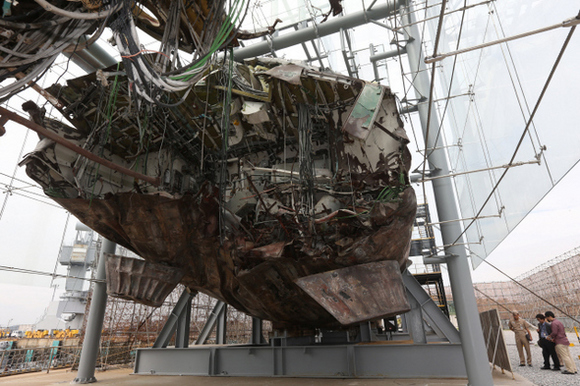
Fast forward five years and the then South Korean government of Park Geun-hye finally makes an overture to ease tense relations between the two Koreas. However, North Korea demands compensation from the South for falsely blaming her for the Cheonan sinking and for all the resulting harm and intensification of sanctions that this brought her. In a deal that was actually brokered by Chan Han Choi, himself, South Korea was to buy coal from North Korea at substantially higher than market price as their means of providing compensation. Initially, a private company acting for the South Korean government, G Hanshin Pty Ltd, actually did agree to buy North Korean coal at inflated prices. Although the deal was later cancelled after South Korea suddenly insisted on the market price, the fact that South Korea once agreed to buy North Korean coal at inflated prices is strong evidence backing claims that Seoul knew that the North did not sink the Cheonan and, therefore, that North Korea was entitled to compensation for the false accusation.
Things get still more interesting. Although Choi was not charged by the AFP for that April 2015 attempted coal deal with the South Korean government, the AFP decided to use this attempted deal as part of their evidence. They submit it as part of showing how Choi is a “Loyal Agent of the DPRK” and asserting his role as a “DPRK Broker.” This evidence that they submit includes draft contracts sent to Choi by the South Korean company that was assigned to conduct the deal with North Korea. Yet there is a strange thing about this evidence submitted by the AFP. In the section of the contracts (written in Korean) where the price is to be listed, there is a “US$” written but then a blank space. The price is not there! We are pouring through documents to be absolutely sure of this but at this stage it appears almost certain that either the AFP or their source (which could be any number of Australian or U.S. or South Korean intelligence agencies) deleted this price from the contracts that they submitted as evidence in the case against Choi. Choi’s supporters maintain that if the initial agreement by South Korea to buy coal at an inflated price from North Korea amounts to smoking gun proof that South Korea knew that North Korea did not sink the Cheonan and was entitled to compensation for the false accusation against her, any secret deletion of the [inflated] price from the evidence presented by the Prosecution represents North Korea’s enemies being caught trying to wipe their dirty fingers off the smoking gun!
Just as the revelation that the claim that “Iraq has weapons of massive destruction” – that was used to justify the 2003 U.S./British/Australia invasion of Iraq – was false hurt the political credibility of the U.S., British and Australian regimes, irrefutable evidence that North Korea was blamed falsely for the sinking of the Cheonan will also hurt the U.S. and Australian ruling classes. This is particularly the case since not only the U.S. imperialists but their Australian junior partner were involved in the bogus “investigation” into the Cheonan sinking. However, should it be irrefutably proven that not only did North Korea not sink the warship but South Korea knew that it did not, the impact on South Korean political life would be on an entirely other level. Here the X in the X-factor would stand for X-plosive! For the false assertion that North Korea sunk the Cheonan has shaped South Korean political life almost to the same degree that the September 2001 attacks on the World Trade Centre shaped American politics. It helped condition the greatly increased hostility to the DPRK within South Korea over the ensuing years, the heightening of sanctions and the growth of hard right political forces within South Korea. If it comes out irrefutably that this is based entirely on lies and that the masses of South Korea have been blatantly lied to this could cause a huge political earthquake there that could shake the very foundations of the South Korean capitalist regime. And ironically, the Australian regime’s persecution of Choi would be blamed for triggering this crisis by their allies in Seoul!
Whatever transpires regarding revelations about the truth about the Cheonan sinking, one thing is clear: the more that the campaign to free Chan Han Choi grows in strength the greater the political price that the Australian capitalist regime that is persecuting him will pay. And we in Trotskyist Platform – and we dare say many of the others involved in the campaign to free Choi – are determined to maximise that political cost. For we understand that we cannot expect Choi to get a fair trial from the racist, rich people’s legal system – even under the unfair laws that Choi has been charged with. Only by mobilising mass actions in defence of Choi and against the sanctions on North Korea can we create an environment where it will be against the political interests of the capitalist regime and its various agencies to continue their persecution of Choi. Moreover, a key part of the struggle to advance the interests of the working class and downtrodden is to expose to the masses the truth that the repressive agencies in this country are not “democratic” institutions that treat everyone equally but exist for the very purpose of maintaining a capitalist “order” that subjugates the working class masses. All supporters of the working class and downtrodden: Let us work harder to free Chan Han Choi! Oppose the Cold War witch-hunt against supporters of socialistic North Korea and socialistic China! Say NO to the new McCarthyism! Struggle against the starvation UN sanctions on the people of North Korea! Expose the truth about the Cheonan sinking! Stand by the DPRK and PRC workers states!
